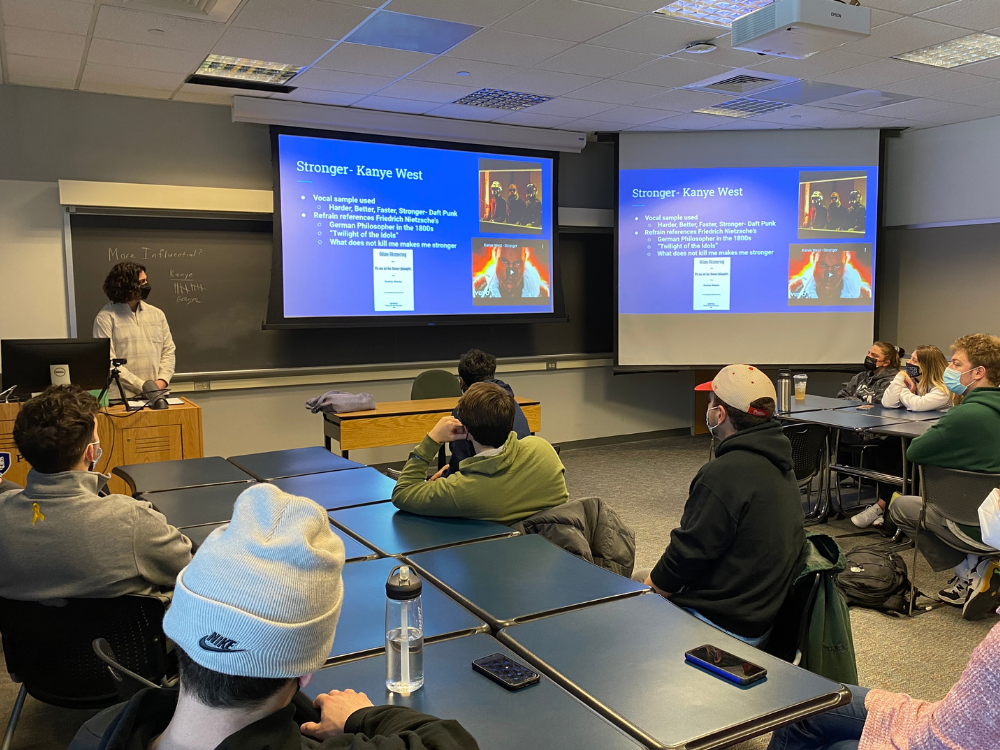UNIVERSITY PARK, Pa. — Launched in the spring of 2020 by College of the Liberal Arts student Josie Krieger and alumnus Michael Miller, the Students Teaching Students program at Penn State offers a unique opportunity for students to create, plan and teach official courses.
Each student who leads a Students Teaching Students course works with a faculty sponsor and undergoes training from the Schreyer Institute for Teaching Excellence at Penn State.
This semester, there are 11 official Students Teaching Students courses being offered, with topics ranging from the menstrual equity movement and Kid Cudi to domestic violence in the LGBTQ+ community and gendered stereotypes in movies. Seven of the available courses this spring are Liberal Arts courses but are open to students across all colleges.
AFAM 297 “Anti-Blackness in America”
Janiyah Davis and Maryah E. Burney are the instructors for “Anti-Blackness in America.” They taught a similar course last semester.
Davis is a Paterno Fellow and Schreyer Scholar double majoring in psychology and criminology and triple minoring in sociology, anthropology and child maltreatment and advocacy studies. She is also in Penn State School of Public Policy’s integrated undergraduate-graduate (IUG) program, completing a master of public policy degree at the same time as her undergraduate degrees. Burney is a Schreyer Scholar majoring in journalism and minoring in sociology and digital media trends and analytics.
According to Davis and Burney, their course is an exploration of how every person living in the United States is impacted by systems of inequality and anti-Blackness. The idea for the class came from an organization called the Multicultural Association of Schreyer Scholars, of which Davis and Burney are members. The association was looking for a way to implement training surrounding diversity, equity and inclusion.
“It’s really hard to get students who have long class days to come to trainings,” Davis said, “One way to do it was to add course credit so they can learn about something that they are really interested in and benefit from it. They get the experience and academic side as well.”
Davis and Burney’s hope for the course is that students develop their listening skills to better understand and learn from other people’s experiences.
“The class is about growing together and understanding each other to better support Penn State students, and I hope they keep doing it once we leave the class,” Davis said.
CAS 297 “Period Talk: The Impact of Stigma on the Menstrual Equity Movement”
Kara Miller, a senior majoring in biomedical engineering, and Jess Strait, a senior majoring in data sciences, are teaching “Period Talk: The Impact of Stigma on the Menstrual Equity Movement.” The course examines menstrual equity locally and around the world through conversations about periods and the need for access to period care and education.
Miller and Strait know each other through the Days for Girls organization on campus and helped start the local chapter at Penn State. Days for Girls is an organization that works to end period poverty — the lack of access to menstrual products and essentials needed for period care — around the world.
“That are so many topics that we wish we could talk about in our club, but we just don’t have time to,” Miller said. “We wanted to focus more on rhetoric surrounding the stigma with periods. We knew that discussions were going to help change this stigma, and it gives the opportunity for students to share their thoughts.”
According the Miller and Strait, their end goal for the course is to have students feeling empowered to talk about periods to anyone.
“Last week, we talked about cultures of menstruation around the world, and next we’re talking about legislation,” Strait said. “It all comes back to being comfortable with periods and understanding how that affects people’s day-to-day life and ensure that periods are never a problem for people to participate in society.”
CRIM/WMNST 197 “Domestic Violence in the LGBT Community”
Jessica Raskauskas is a senior double majoring in criminology and women’s studies with minors in sociology and English. She is teaching “Domestic Violence in the LGBT Community” this semester. The course focuses on the ways that domestic and intimate partner violence affects members of the LGBTQ+ community, in addition to the systems and services available to aid in leaving abusive relationships.
Raskauskas believes that domestic violence is not a topic that is taught about as much as it should be. While she was completing research abroad over the summer, she realized that when people talk about domestic violence, it is mostly focused on cisgender heterosexual couples. That’s when she thought of the idea for her course.
“The biggest outcome from my class is a better understanding of what domestic violence can look like,” Raskauskas said. “There are so many ways domestic violence can manifest itself, so I want my students to be better informed about the different warning signs and ways that they might see it in the real world. I also want them to be more thoughtful and more empathetic when talking about difficult topics like this.”
In her class, Raskauskas also adopted the concept of a “safe space,” where students are encouraged to talk about experiences that they might have gone through and to be open with their peers.
“I was also able to establish that personal stories do not leave our classroom,” Raskauskas said. “You can tell your friends the notes, but anything that anyone shares about their personal life, the door is closed. Having my students feel safe is really important to me.”




